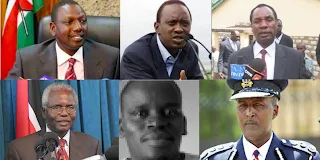Christmas is a time of giving, and this year, no case is more deserving than the defence of six innocent Kenyans due to face charges of rape, murder, torture and displacement of populations.
Just imagine the fear that grips innocent people when they show up at a local magistrate’s court, then increase it a hundredfold for appearing before three judges in a faraway international court with windows frosted by snow. The country is duty-bound to ensure that the six Kenyans named as suspects by the Chief Prosecutor of the International Criminal Court are steeled for a long and rigorous trial lest they start building an inexplicable puddle of cowardice at their feet in the courtroom. Kenya’s image as the home of the brave Maasai warriors would be irrevocably soiled, with obvious ruinous consequences for tourism. Courage does not come cheap in the face of international persecution. Energy minister Kiraitu Murungi, who holds erudite views about raping women who are already too willing, has great difficulty imagining one of the three suspects violating anybody. He has spend some time researching the cost of finding and retaining the best legal minds to prove the innocence of these six Kenyans. The consolidated cost of securing their freedom through lawyerly arguments is a measly Sh900 million.
These suspects are all poor people who have given their lives to public service and nary a thought to feathering their nests. For example, one of the six men told the BBC that he was worth a mere $10 million (nearly KSh1 billion) five years ago. A KSh150 million legal services bill would turn him into pauper and see him off to River Road, beggar-bowl in hand. Meanwhile, his mother told a local language radio station recently that the man’s father, a former head of state, left the family nearly indigent: “Mzee had no money, but I sold some land to help educate (the children)," she waxed lyrical. "I realised education was the only thing I could give them because with education and hard work, even without wealth, one can succeed.” Were he to squander whatever is left of his little wealth, poverty would easily become a generational curse, with his children having to seek free education in public schools. The inspired observation by Planning minister Wycliffe Oparanya that “all the people going to The Hague are Kenyans” should tug at every heartstrings because there's a chance that some of the victims — 1,133 dead, 650,000 displaced, thousands raped and maimed — might have been Martians.
Yet, Kenya made a KSh29 billion appeal to meet the needs of the displaced. The Government gave KSh0.5 billion in the 2008/09 financial year, and another Sh2.2b in the year after that.
Since all the genuine Internally Displaced Persons have all left the camps and only the pretenders are still hanging around three years later, focus must now shift to the six suspects. The Government must be the biggest giver even this time around. Kenya cannot allow the six suspects to apply to be treated as paupers at The Hague. Every Kenyan should give generously to secure the innocence of these patriots — for it is more blessed to give than to receive.
Since their possible trial is a blemish on the good name of Kenya — being ministers, top civil servants and opinion leaders — it would shame all of us, especially after the promulgation of a new Constitution that says we are sovereign. Therefore, the public purse must be extended to secure their discharge. Their legal defence budget — together with travel and accommodation — should come from the Supplementary Budget in February. This expense was unexpected but entirely warranted.
Freed from the encumbrances of fear and financial worry, the six suspects can dazzle the world with their reasoning and logic, pick away at the Rome Statute, and convince the world that Kenya is indeed more than the home of athletics and corruption. Before you know it, all the jobless graduates would have jobs abroad working for governments and multinational corporations.
In dealing with the post-election violence, justice, fairness and balance must be applied to the accused and the victims in equal measure. This means that if you assist the IDPs, you also must assist the accused. So far, IDPs have received Sh6 billion. At just under Sh1 billion, the legal costs of defending the six suspects is a bargain. It is so little that it cannot constitute a scandal even if it was stolen.
Kenyans are used to losing billions of shillings through pilferage. It is better to give away a billion with a clean heart than to have it stolen from public coffers. In the event that the suspects are guilty, the Exchequer can always demand a refund, Anglo-Leasing style.



Comments